Was Judy Garland too Jewish for show business?
Though she was born Episcopalian, the singer’s associations with Jewish artists and collaborators is the stuff of legend
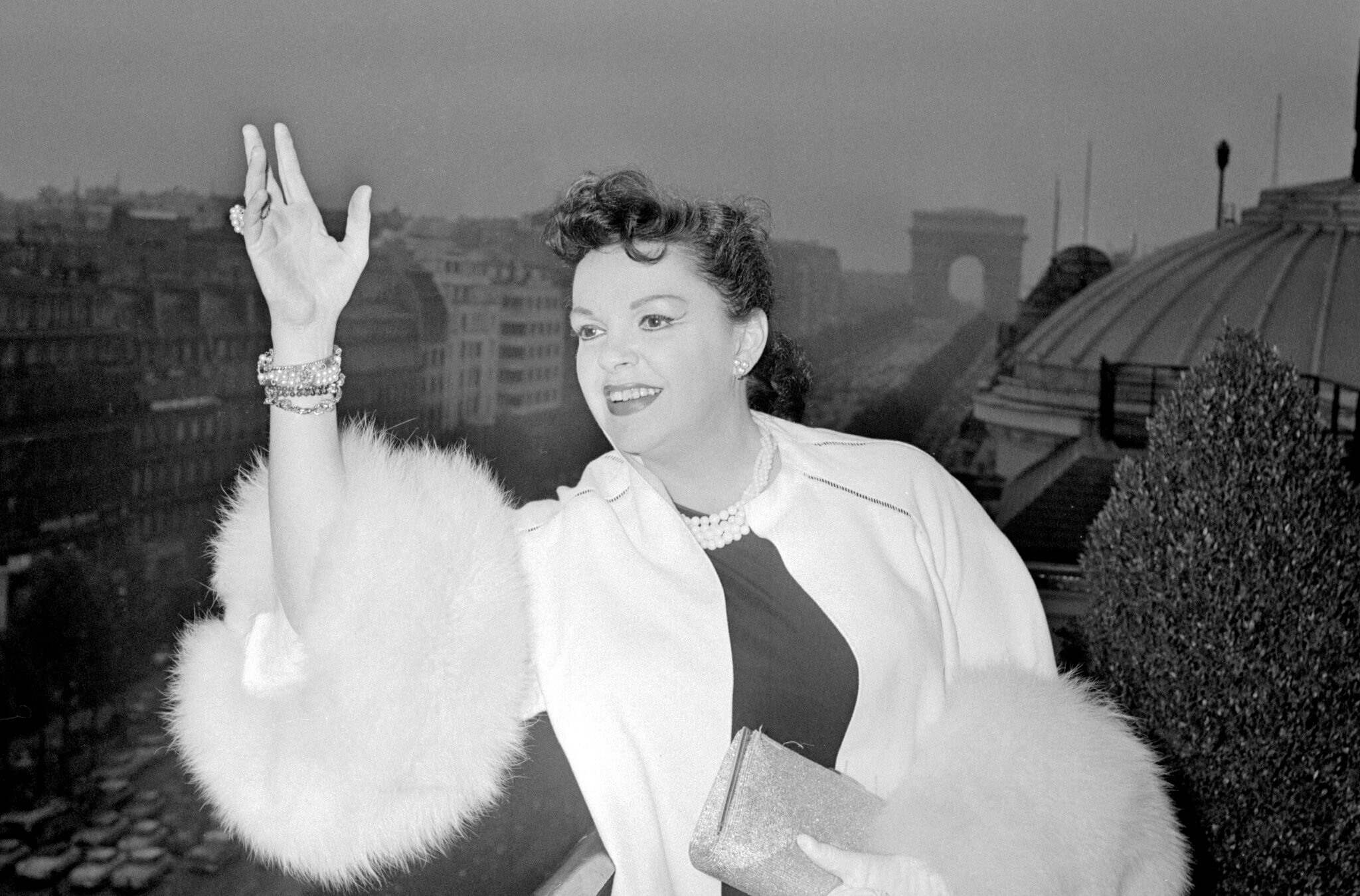
Judy Garland would have turned 100 on June 10, 2022. She is seen here in Paris, 1960. Photo by Getty Images
When the Jewish comedian Jerick Hoffer, better known by the stage name Jinkx Monsoon, impersonated Judy Garland on a recent episode of “RuPaul’s Drag Race All Stars,” the tribute showed how strongly Jews have been friends of Judy, to the point of wanting to become their own idealized conception of her.
From the start of her career, Garland, whose centenary is celebrated June 10, radiated onscreen wholesomeness that enchanted Jewish audiences seeking comfort at a time when rising Fascism in Europe would soon lead to the Holocaust. One interviewee in the oral history “Growing Up Jewish in America” recalled that at the old Midwood Theater on Brooklyn’s Avenue J, a haven for kosher restaurants, 1930s audiences would kvell at Andy Hardy pictures: “They were wonderful people: Mickey Rooney and Judy Garland. And Andy Hardy’s father, Lewis Stone — there couldn’t be an ounce of antisemitism in a man like that.”
Naturally, what was shown onscreen had little to do with the reality of the lives of each performer, and Judy Garland’s abbreviated, complex existence has been exposed in over a dozen books as well as films and TV programs. In our age of heightened sensitivity about some aspects of racial bigotry, it is noteworthy that Garland has yet to be canceled, even though she appeared in blackface in “Everybody Sing” (1938) and again in “Babes on Broadway” (1941). In the latter film, she sang “Waiting for the Robert E. Lee,” a 1912 opus with lyrics by the Ukrainian Jewish songwriter L. Wolfe Gilbert.
Gilbert was one of many Tin Pan Alley Jews who fled Old Country pogroms only to myopically express nostalgia for plantation days in the American South. Another such was Irving Berlin, whose 1912 “When The Midnight Choo-Choo Leaves For Alabam’” was memorably sung and danced by Garland in the 1948 “Easter Parade,” even if the song itself teeters on absurdity, ably spoofed by Broadway wit George S. Kaufman.
With mock literalness, Kaufman pointed out that in fact, no midnight train to Alabama departed from Pennsylvania Station. Critics Michael Lasser and Philip Furia added that Berlin had created a bizarre mise-en-scène where a nostalgic African American narrator was returning to his home state just when real-life African Americans were fleeing violent Southern racism for the usually more subtle northern variety.
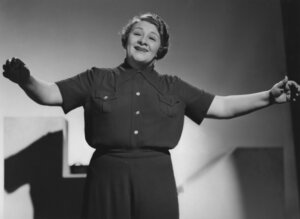
Many of Garland’s chief song successes revived hits originally introduced by Al Jolson, the now-criticized Jewish blackface entertainer whose numbers such as Gershwin’s “Swanee” and “Rock-a-Bye Your Baby (With a Dixie Melody)” the latter co-written by the Hungarian Jewish composer Jean Schwartz and lyricist Sam M. Lewis (born Samuel M. Levine) were used as templates by Garland. The musical history “Jazz Age Jews” counts 33 extant Garland recordings of “Swanee” and 48 of “Rock-a-Bye.”
Yet Garland had another key Jewish artistic predecessor. She owed much to Sophie Tucker (born Sofia Kalish) who played her mother in two films. In 1937, Tucker was convinced by studio publicists to dub Garland her performing heir, even before the latter’s career took off in “The Wizard of Oz.”
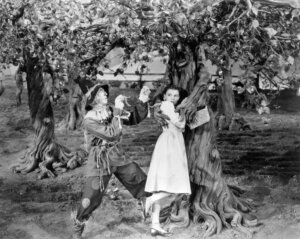
Yet studio bosses, almost all of them Jewish, may have decided that it was necessary to de-Judaize Judy, the symbolic daughter of Jolson and Tucker. Had Judy, raised Episcopalian, assimilated too much Yiddishkeit? In our time, the authors of “Judaism For Dummies” coincidentally note that they prefer to pronounce the word Judaism as “Judah-ism” rather than “Jude-ism” or “Judy-ism” because the latter pronunciations make it “sound like you’re talking about Judy Garland.”
Garland’s passion for all things Jewish was evident early on. She had romantic affairs with Jewish creative studio denizens, from bandleader Artie Shaw and director Joe Mankiewicz to pianist and actor Oscar Levant.
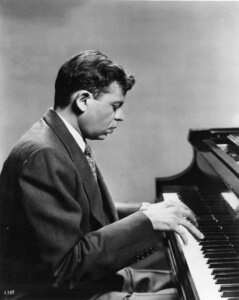
MGM studio boss Louis B. Mayer was reportedly so concerned with Garland’s precocious sex life with studio Jews that she was assigned a duenna, MGM publicist Betty Asher, daughter of producer Ephraim Asher, and according to some gossipy mavens of Judyiana, Garland in turn started a relationship with Betty Asher.
For Garland, Judaism and eros were long indissociable. Her first marriage was to composer and arranger David Rose, whose immortal instrumental piece “The Stripper,” released just 60 years ago, evocatively depicted the bumps and grinds of burlesque queens in sound as ideally realized program music.
Unlike her career-long assumption of Jolson’s mantle, Garland stayed away from trademark Sophie Tucker songs, and apparently never recorded “My Yiddishe Momme,” although that song’s maudlin bellowing would have suited her onstage persona. Garland did record Sholom Secunda’s “Bei Mir Bistu Shein” for “Love Finds Andy Hardy” (1938), but this was cut before the film’s final release. Performed at an odd dirge-like tempo with abundant melismas, Garland’s “Bei Mir Bistu Shein” had a quasi-liturgical weightiness, leading the musicologist Tina Frühauf to describe it as a “cantor-ish rendition” in “Experiencing Jewish Music in America.”
An inaccurate rumor, cited by song historian Jack Gottlieb, claimed that Garland (born Frances Gumm) was the Jewish niece of songwriter Harry Von Tilzer (born Aaron Gumbinsky). Among songwriters inspired by Garland’s voice, Harold Arlen (born Hyman Arluck) son of a synagogue cantor, created “Over the Rainbow” and “The Man That Got Away” as mini-operas of poignancy and grief, helped by the lyricists E. Y. Harburg and Ira Gershwin, respectively.
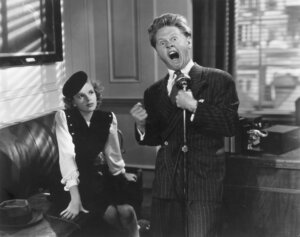
The overt emotion and heart-tugging messages hearkened back to the Yiddish theater. Yet just as when the studio prudently deleted Garland’s attempt at Yiddishkeit from “Love Finds Andy Hardy,” her later nonmusical acting onscreen in a Jewish context could be ill-judged. Stanley Kramer’s cinematic adaption of Abby Mann’s “Judgment at Nuremberg” (1961), arguably less effective than the original television version filmed two years earlier for Playhouse 90, was a case in point.
In the movie, Garland plays a German woman accused during the Nazi era of having an illegal relationship with a Jewish man. Hectored by a German defense lawyer played by Maximilian Schell, Garland was by then one of Hollywood’s notorious ruins; another was Montgomery Clift, who appears in the Kramer grief-fest as another collateral non-Jewish victim of the Holocaust; in reality, Garland and Clift were just examples of the collateral damage of screen stardom. At one particularly overwrought moment in the film, Garland begins to imitate Schell’s accented inflections in English pronunciation, presumably inadvertently.
Had she lived longer, Garland might have been typecast in further Holocaust-related dramas, but the fragmented nature of her tormented stardom is perhaps best captured not by any drama or miniseries aspiring to realism, but the Austrian experimental filmmaker Martin Arnold’s short “Alone. Life Wastes Andy Hardy,” praised by critic Jonathan Rosenbaum.
Manipulating frames from Garland’s appearances in the Andy Hardy films, the filmmaker has Garland sing, as Rosenbaum puts it, “first like a melancholy foghorn and then as if someone has just stepped on her foot.” The underlying pain always present in Garland’s artistry, complemented her role as America’s sweetheart shepherded into superstardom by Louis B. Mayer, ever-eager to create emblematic Americana.
Later accounts by Jewish showbiz colleagues like Mel Tormé and particularly a gruesome memoir by her former manager Stevie Phillips, show that even devoted admirers of Garland’s abundant talents could eventually be heartbroken by her self-destructiveness.

















